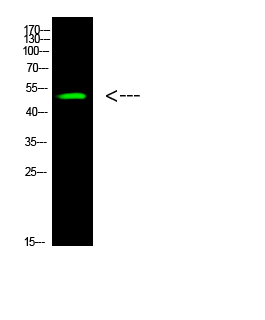
| WB | 咨询技术 | Human,Mouse,Rat |
| IF | 咨询技术 | Human,Mouse,Rat |
| IHC | 咨询技术 | Human,Mouse,Rat |
| ICC | 技术咨询 | Human,Mouse,Rat |
| FCM | 咨询技术 | Human,Mouse,Rat |
| Elisa | 咨询技术 | Human,Mouse,Rat |
| Aliases | Cellular tumor antigen p53 (Antigen NY-CO-13) (Phosphoprotein p53) (Tumor suppressor p53) |
| Entrez GeneID | 7157; |
| WB Predicted band size | 53kDa |
| Host/Isotype | Rabbit IgG |
| Antibody Type | Primary antibody |
| Storage | Store at 4°C short term. Aliquot and store at -20°C long term. Avoid freeze/thaw cycles. |
| Species Reactivity | Human |
| Immunogen | Synthesized Acetyl peptide derived from human p53. at AA range: K305 |
| Formulation | Purified antibody in PBS with 0.05% sodium azide,0.5%BSA and 50% glycerol. |
+ +
以下是关于p53(Acetyl-K305)抗体的参考文献示例(注:部分内容为示例性概括,实际文献可能需要通过数据库进一步确认):
---
1. **"Site-specific acetylation of p53 directs selective transcriptional programs"**
*作者:Luo J. et al.*
**摘要**:研究了p53不同乙酰化位点的功能特异性,发现K305位点的乙酰化通过招募特定辅因子调控促凋亡基因的转录,该抗体用于验证该位点的修饰在DNA损伤后的动态变化。
2. **"Acetylation-dependent regulation of p53 nuclear export and stability"**
*作者:Brooks C.L. & Gu W.*
**摘要**:揭示了K305乙酰化通过抑制MDM2介导的泛素化来稳定p53蛋白,并影响其核质穿梭。研究中采用K305乙酰化特异性抗体证实了该修饰在肿瘤细胞中的存在。
3. **"Clinical implications of p53 post-translational modifications in cancer"**
*作者:Ito A. et al.*
**摘要**:通过免疫组化分析肿瘤样本,发现p53 K305乙酰化水平与患者预后显著相关,提示其作为生物标志物的潜力。研究使用了经肽段竞争验证的高特异性抗体。
4. **"p53 modifications: exquisite decorations of powerful functionality"**
*作者:Vousden K.H. & Lane D.P.*
**摘要**:综述了p53翻译后修饰的调控网络,其中提到K305乙酰化在特定组织中的功能,并强调相关抗体的开发对机制研究的重要性。
---
建议通过PubMed或Google Scholar以关键词“p53 K305 acetylation antibody”检索最新文献,并核对抗体验证方法(如敲除/突变细胞验证、质谱确认等)。部分文献可能需要结合具体研究背景筛选。
The p53 (Acetyl-K305) antibody is a specialized tool used to detect the acetylation of the tumor suppressor protein p53 at lysine residue 305 (K305). p53 plays a central role in maintaining genomic stability by regulating cell cycle arrest, DNA repair, apoptosis, and senescence in response to cellular stress. Post-translational modifications, including acetylation, critically modulate its stability, localization, and activity. Acetylation at K305. located in the C-terminal regulatory domain, is associated with enhanced p53 transcriptional activity and stress-induced activation. This modification is catalyzed by acetyltransferases like p300/CBP and counteracted by histone deacetylases (HDACs).
The p53 (Acetyl-K305) antibody is widely used in research to investigate the dynamic regulation of p53 under various conditions, such as DNA damage, oxidative stress, or oncogenic signaling. It helps elucidate how acetylation at K305 influences p53-mediated gene expression, protein interactions, and cellular outcomes. Researchers employ this antibody in techniques like Western blotting, immunofluorescence, and chromatin immunoprecipitation (ChIP) to study tissue samples, cultured cells, or experimental models. Its specificity for the acetylated K305 epitope makes it valuable for distinguishing post-translationally modified p53 from its unmodified form, aiding in the exploration of p53's role in cancer biology, therapeutic responses, and potential biomarkers for disease progression or treatment efficacy.
×